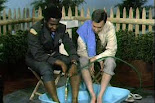 |
| A consistent team of 10's |
(40 Summers 40 Lessons Series)
John Maxwell says, “Whenever I see my staff, I put an imaginary “10” on the forehead of each individual. This helps me treat each person like a 10, a high performer who makes a difference to me and the organization. Inevitably, they respond as if they are a 10!
If you
don’t already do this, why not start today? Put “10s” on the people you lead.
Treat them based on their potential, not their performance. You’ll be amazed
how both will rise.”
It is
John’s law of the lid. “Your leadership is like a lid or a ceiling on your
organization.” As you help raise the lid on your colleagues and team members
you will see yours rise as well.
My Story:
The moment I had met the new HR manager, I knew that there was something that need clarification. That individual had told me that they were there to help me. I had heard the old adage and had often joked with others about how government folks are here to help. “I’m Dewey Tentical. I’m from the government and I am here to help.” That’s how the joke goes; right?
I went on
to listen to the reasons things are done the way they are and that the system
was put in place to help me.
Over the
next several years, each time I went to the HR offices, I was always met with
that manager and the top reasons why what I had just turned in where in fact
done incorrectly. (This was the world prior to online on boarding of employees.) I got to the point that it was one of the most dreaded portions of my position.
While I loved bringing staff on to develop and lead and grow, the paperwork portion
was dreadful.
For those
in the seasonal camp industry, the spring time was all about that on boarding
process and making sure that the employee that you had spent hours recruiting,
interviewing, reference checking to finally have them accept the position. And then,
the paperwork.
 |
| Not actual picture of Cathy. |
It seems
that whatever tactic I approached her with made me frustrated and often
resentful of any experience with that individual.
I would
recount stories with my staff team of how ridiculous the process was and how hard I would work to
make it happen. It seemed that I was missing a crucial piece of information.
Undergoing
a transformation is never easy. At this point I had read a dozen of John
Maxwell’s books as well as dozens of other leadership and management books. I
could not see a way that she would ever change and embrace anything that
resembled what I was looking for in the way of service.
I knew
that her leadership lid (one of John’s irrefutable laws of leadership) was
stuck and something needed to change.
It was
during a retreat where I was rereading one of John’s books that it suddenly occurred
to me. That retreat was about leadership and I was asking for something from her and
limiting my belief about that individual. I had never put a 10 on her forehead.
I had not
been grateful in any way for the lesson I was being presented with from Cathy.
I had never even thought of her as someone that I could learn from and had made
Cathy into a position and not the person that she was and the potential that
she could share.
I had a
limiting belief about someone and had prided myself for years on how I saw
everyone in that leadership capacity of being their best self, with that exception.
I had made that mistake and I changed
how I looked at Cathy.
From that
day forward each encounter I had started with a silent prayer about the “gift”
that Cathy was bringing to me on that day.
I cannot say
that all my corrections on HR forms ended that day or that a process was missed
in on boarding a new team member. I did however change my reaction and how I
looked at a fellow human being who was doing her work and I had just
dehumanized her into a manager.
A wise man said “We have different gifts, according to the grace given to each of us. If your gift… if it is serving, then serve…”



















